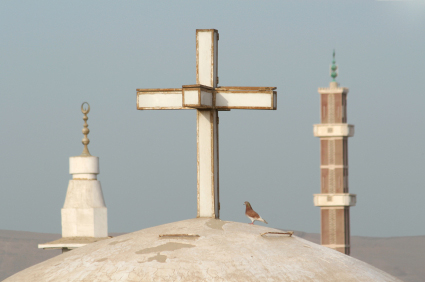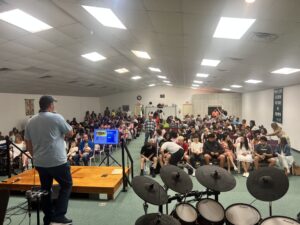
BAGHDAD, Iraq (BP)—Al-Qaida in Iraq has declared that Christians in the Middle East are “legitimate targets” for violence, after the group carried out an unprecedented attack on a Baghdad church.
The Islamic State of Iraq, with ties to al-Qaida, released a message Nov. 3 saying, “The Ministry of War of Islamic State of Iraq declares that all the centers, organizations and bodies of Christian leaders and followers have become legitimate targets by the Mujahedeens, wherever our hands will reach them,” according to a CNN report, which the U.S. Commission on International Religious Freedom circulated to its e-mail list.
Richard Land, a USCIRF commissioner and president of the Southern Baptist Ethics & Religious Liberty Commission, told Baptist Press members of al-Qaida have shown themselves to be murderous barbarians.
“This is just further confirmation that they operate outside the rules of civilization. They should be condemned by every civilized people and every civilized faith,” Land said. “This is an excellent opportunity for the too often silent Muslim community in the United States to condemn these threats against Christians and to condemn the atrocities that are being committed in the name of their faith.”
The Islamic State of Iraq claimed that its declaration targeting Christians was brought on by a dispute regarding women they allege are being held captive by Egypt’s Coptic Church, and they attributed their anger over the situation to prompting the attack on a Baghdad church that left nearly 60 people dead Oct. 31.
“The sword of slaughter will not be lifted off the necks of their followers until they denounce what the dog of the Egyptian church has committed, and until they show the Mujahedeens their serious endeavor to pressure the combatant [Coptic] church for the release of our Muslim sisters, who are captive in the prisons of their [monasteries],” the militant group said Wednesday.
Mike Edens, professor of theology and Islamic studies at New Orleans Baptist Theological Seminary who ministered in the Muslim world for 25 years, said to understand the accusation against the Coptic Orthodox Church, one must understand that historically claims have been made against Christian churches in the Middle East that they are comforting and protecting women who are identified as Muslims.
“Frequently these women have come from a Christian background and they were secured as a wife by a Muslim and were forced to convert or chose to convert, and then they’re seeking to convert back,” Edens told Baptist Press.
“They don’t have the freedom to do that, and they seek the protection of the church and they may even take vows to be a nun and be in a convent or a monastery. There is an element of factual basis to the claim, but it’s more complex than the secular news media is capable of helping us understand.”
The claim that al-Qaida in Iraq is making, Edens said, is a red herring because the jihadists make it seem as if they would accept a Christian presence among them if the women were not being held by the Coptic Church.
“That is not true,” Edens said. “Unlike the general Islamic population, members of jihadist Islamic groups, members of al-Qaida in particular in this case, have committed to an ideology that is opposed to all Christians in their midst. Not only that, they are opposed to all other religious expressions including expressions of Islam that are different from their own.”
Al-Qaida has killed more Muslims than Christians, Edens said, and they are antagonistic and belligerent against anyone who holds a different worldview than the jihadist ideal, which is the establishment of a global Islamic republic that is ruled by nothing but the Quran.
“They were clearly attacking this Syriac Catholic church, which is not connected with the Coptic Orthodox church, to try to mute the effect of the Christian Gospel and the Christian church,” Edens said. “Ideally, they would like the church to be removed from their presence. They see the church as an obstacle to their objective of having complete political power.”
Al-Qaida will give various reasons for opposing Christians, but the bottom line is that unlike the majority of Muslims, the jihadists are ideologically opposed to Christianity, Edens said.
“It was clearly an attack against vulnerable Christians to try to encourage them to emigrate out of Iraq, to reduce their voice in Iraq, to intimidate them,” he said. “I think also that contrary to the popular view, Islam is not a monolith, and the few people who were engaged in this assault represent a very small minority of Islam.”
The jihadists, Edens said, are trying to eliminate voices of peace, moderation and cooperation, and the Christian church is “a large voice in that choir” of making a better society.
“We as Christians who are in freedom need to pray for our brothers and sisters not just in Islamic countries but in much of the rest of the world who are suffering for their identification with the Gospel of Jesus Christ,” Edens said. “We have freedom to pray for them and to intercede for them and to learn of their plight and to send missionaries to walk alongside of them, and we need to be faithful in that.”
Southern Baptists have a strong heritage of religious freedom and a strong evangelical witness, Edens said, and believers must continue the mission even amid real threats of violence.
At Golden Gate Baptist Theological Seminary in Mill Valley, Calif., associate missions professor Eddie Pate said news of the “legitimate targets” statement can help believers in the West understand the intense pressure that Christians in the Middle East have lived under for many hundreds of years.
“Their life has never been easy,” Pate, a former mission worker in North Africa and the Middle East, told BP. “The church in the West could learn from and take courage from their faith and commitment under pressure. We should pray for them and support them.”
Pate noted that in countries such as Egypt, Sudan, Jordan, Lebanon, Palestine and Syria, churches and mosques exist on the same street with their members interacting in daily life. The leaders of those countries, while often Muslim themselves, typically feel more of a threat from fundamentalist Islam than from Christians, he said.
Also, the situation in Egypt has been tenuous in the past 50 years with an uneasy peace existing most of the time between the Coptic Church and fundamentalist Islam.
“This peace is broken from time to time in often violent ways,” Pate said.
–30–
Erin Roach is a staff writer for Baptist Press. For Baptist Press’ initial story on the attack against the Syrian Catholic church, Our Lady of Salvation, in Baghdad, go to https://www.bpnews.net/BPnews.asp?ID=34004
















